“When we weren’t shooting, we behaved as siblings: we played and ate together. This friendly relationship extended to the veteran actors, and this made working on the set fun.” – Kayode Ojuolape Jnr
By Seyi Lasisi
Ijogbon is Kunle Afolayan’s recent cinematic outing since Anikulapo, released in 2022. As expected, Afolayan had an omniscient presence in the film, but the most commendable part of the feature was the authentic acting as carried by the four young actors: Kayode Ojuolape Jnr, Ruby Akubueze, Oluwaseyi Ebiesuwa, and Fawaz Aina.
Ijogbon which orbits around the lives of four teenagers learning the dictates of lives in their remote Oyo-Oke community. The group, subtly led by Jamiu (Ojuolape), has Ranti ( Ebiesuwa), the silent overthinker, Oby (Akubueze), the emotional core of the group, and Omooba ( Aina), the free-spirited member of the quartet who trivialises everything. Their discovery of some uncut diamonds brings chaos into the group and sets the trajectory for this coming-of-age adventure film. While the diamonds bring distrust into their seemingly perfect friendship, the believable acting helps convey the genuineness of the situation. Their ability to connect to the character traits of their distinct roles made it easier to admire and detect the subtle differences between these friends.
I’m no stranger to Akubueze’s believable performance. I have seen her performance as Amaka in Seun Richards’ deeply emotional She. Although I had not seen Fawaz’s cinematic performance, I am familiar with film trailer remakes and parodies from the Ikorodu Bois which he is a part of. Ojuolape Jnr and Ebiesuwa – who are best friends – are new faces to me. As Ebiesuwa will inform me, Ijogbon is his debut acting role. While Ijogbon is not Ojuolape’s debut acting role, it is one of his mainstream roles in Nollywood.
In this exclusive interview with Afrocritik, Ojuolape, Akubueze, and Ebiesuwa speak about their entry point into acting, preparing for their distinct roles in Ijogbon, and their opinions about the “Japa” syndrome in Nigeria.
Despite being a writer, it is often tricky to express my feelings when I achieve something monumental. Ijogbon may not be your first acting role. But it sure is one of your career-defining roles for you. How did you feel working on this project? Also, how do you feel about the audience’s reception of the film, especially the roles you played?
Ojuolape: I feel blessed and established. As you said, Ijogbon is one of those career-defining roles I was looking forward to. This was why when I got the role, I knew I had to prove a point. And with the audience reception, I’m sure I did a good job. On the Internet, I see tweets and comments stating how Jamiu (the character I played) is selfish and greedy and those comments make me happy. When I did the character breakdown for Jamiu, I told myself that if people liked my character, then I had failed. The audience knew I delivered a commendable performance even though they did not like the character I played.
Akubueze: It was an interesting and challenging journey working on set. Challenging because, the setting, lifestyle, and characterisation of Oby were different from the roles I played before Ijogbon. It was a new experience for me. The reception is amazing. On social media, I see how people can relate to the different characters we played in the film.
Ebiesuwa: For me, it was amazing and adventurous. Apart from filming, there was always something to learn in the town. Kunle Afolayan has over time, been my mentor, so it was amazing working closely with him. The reception from my friends and family has been great. My friends are surprised I could play the role of Ranti, which is different from who I am as a person. Being my debut acting role, the audience reaction has been great.
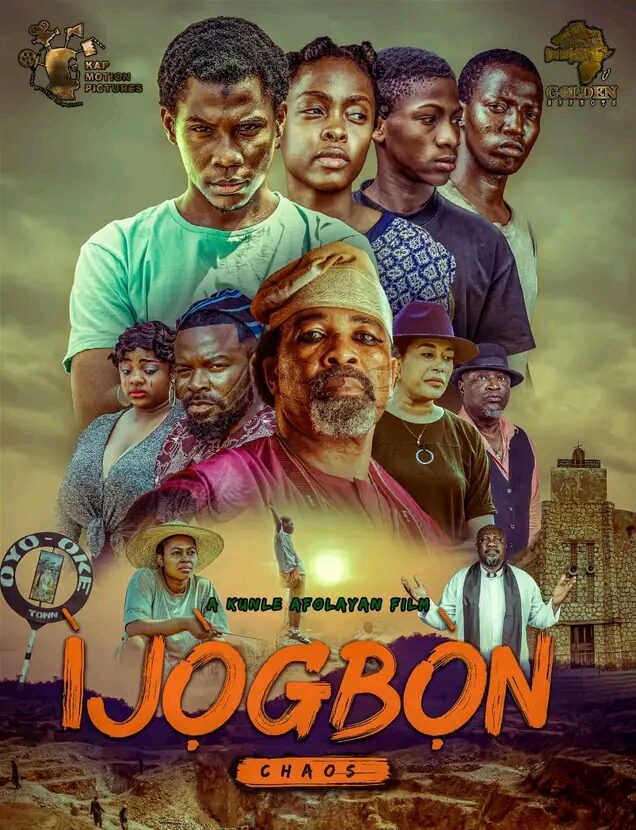
My decision to be a full-time writer was taken recently, with subtle yet discernable criticism from my parents. I am sure your decision to become an actor may have caused some reaction from your loved ones. At what point did you decide to be an actor? And how did those around you feel about this?
Ojuolape: I started acting in church and in secondary school. However, I professionally made acting a career choice in 2013 when I went to Lagos. I told my dad, who wanted me to study Law, about my career decision and he was not comfortable with it. He believed actors are just dancers with nothing to show for it. This view was influenced by what he saw in Ibadan, where he saw Yoruba actors who weren’t financially buoyant. Although I understood my father’s concern, I was keen on acting because it was my passion. My dad aside, other people supported my decision. My sister paid the tuition fee for the acting school I attended and gave me transport fare daily for three months. After this training, I went to Obafemi Awolowo University (OAU), Nigeria, to study Performing Arts; majoring in Directing.
Akubueze: For me, acting has always been something I wanted to do. Fortunately, I have a supportive family. At first, my father was not accepting of my career decision. But my mother and my siblings have always been very supportive from the beginning. Over time, my father has come to accept and understand my decision. Acting has been a passion of mine for years. And I have gradually built up my career to this moment. I started acting in my church drama group and took off from there.
Ebiesuwa: I have a similar experience with Ruby. My family’s reaction to my decision to be an actor was not welcoming. I have been acting in my church drama group playing Jesus-esque roles. However, I chose acting as a career path after my secondary school education. I started my filmmaking career learning behind-the-scenes jobs. I learned to edit. After this, I became interested in continuity management. When I enrolled in Obafemi Awolowo University (OAU), I studied Performing Arts with Directing as my major. I was more interested in being a director than an actor because of my interest in working behind the scenes. Ijogbon was the first time I did anything professionally acting-related. Before Ijogbon, I did not consider myself an actor. Although I acted during my university days, it was more for the stage than the screen.
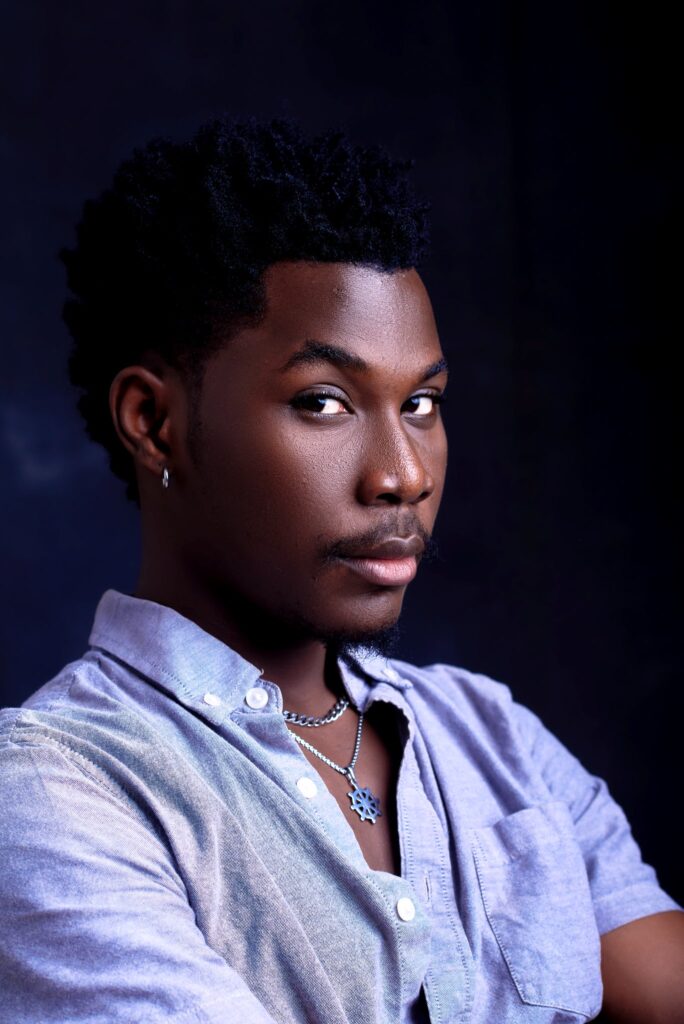
I interviewed Olarotimi Fakunle, one of the lead actors in Gangs of Lagos. Like you, he has a background in theatre. What do you consider the point of convergence between acting on the stage and screen? And how has your training as a theatre actor helped prepare you for your acting on the screen?
Ojuolape: Theatre taught me discipline and endurance. With theatre, there are certain ethics you have to imbibe as an actor. Although acting onscreen is more lucrative than acting on the stage, you still see people sticking to stage acting. The reason is because they are passionate about stage acting. I am equally passionate about working in theatre and film.
Prior to watching Ijogbon, I saw She at The Annual Film Mischief and Ibadan International Film Festival where you gave a commendable performance. How do you prepare for the roles you play?
Akubueze: First, I try to understand the character. Once I have this understanding, it becomes easier to deliver a believable performance. One of the ways I prepare for a role is to imagine becoming a character. I assume that I have experienced what the character passed through. This preparation makes it easier to deliver a believable performance and stay in line with the characterisation I and the creators of the character have built up. There is also the development of my acting skills. I don’t just sit around after every gig. I am constantly learning and unlearning. I watch TV series and films to understand how other actors approach acting. I also try to study the people around me. This helps me gather insight into different characters.
The lurking dilemma in Ranti, your character’s mind, is not wanting to live your parent’s dream. As a Nigerian, I can relate to parents wanting their children to live their dreams. Do you have a personal experience with the characters you played? And what do you think about parents deciding their children’s future?
Ebiesuwa: We live in a society where parents want their children to achieve what they are unable to. Some parents just vaguely have career choices (footballer, lawyer, or doctor) they intend their children to explore. This career choice is often forced on the children. I think this speaks to how parents don’t really understand their children. The majority of Nigerian parents, even in Ijogbon, don’t know what their children are capable of. Oby and Jamiu’s parents didn’t understand them. Their parents were oblivious to the children’s plans and abilities. And this obliviousness to their children’s dreams is why I feel Nigerian parents often try to influence their children’s career choices.
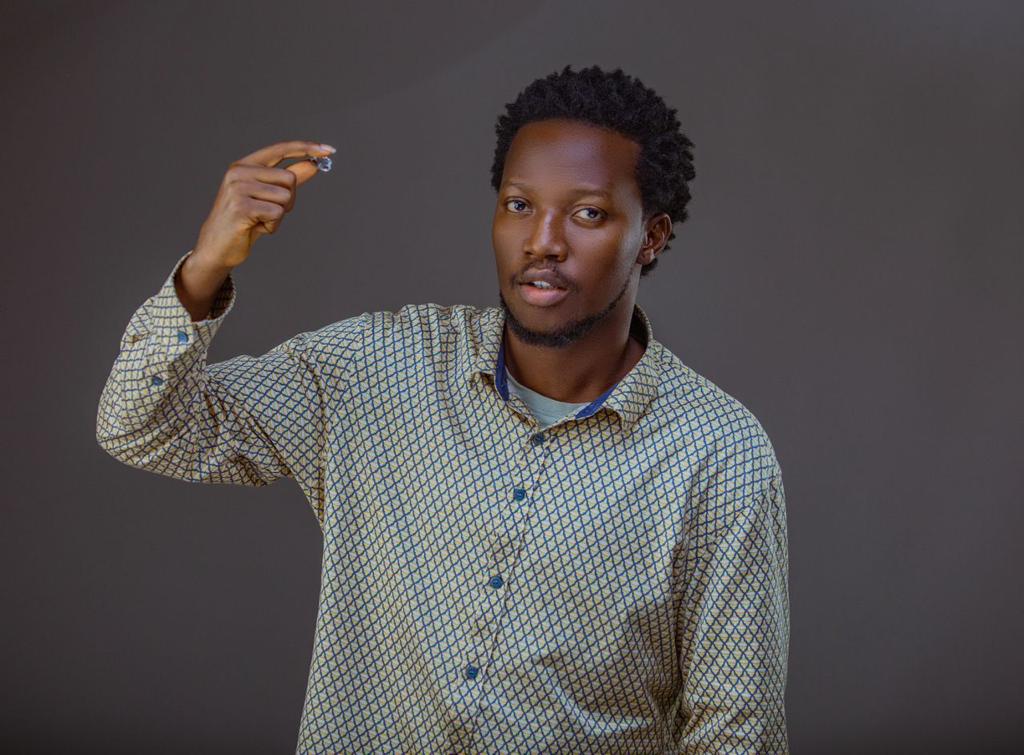
A few minutes into the film, it was easy for me to detect the subtle difference between each of the characters you played. Each of you had distinct character traits that held the fabric of the relationship. How did you prepare for your role?
Ojuolape: First, I had to become a Muslim and learn how to pray. And for the context of this interview, when I went to Lagos in 2013, I couldn’t communicate in English. I had to learn how to speak English and curb the Ibadan accent in my speech. When I got the role for Ijogbon, I had to become that kid who left Ibadan. I had to learn to speak the Oyo-Oke accent again. Although Jamiu can speak English Language, he occasionally speaks the Yoruba Language. For actors, imagination is our friend. Thus, I had to imagine and imbibe some of the character traits of Jamiu. I had to imbibe Jamiu’s passion about “japaing”. I had to imagine what it means to want to leave a place that you feel is not favourable to you.
Akubueze: Alongside the information and backstory that has been given to me concerning the character, I had to also build a story behind who Oby is. I asked myself, “Who is Oby, why does Oby do what she does, what does Oby believe in, and what are those things Oby won’t do?” These questions made it easier to connect to the character. I had to use my creative prowess to create something I thought applied to the character. Also when I was on set with my fellow cast members (Ojuolape, Ebiesuwa, and Aina), the synergy was there. So I was able to discuss those ideas, thoughts, and traits of Oby I had about the character. I also prepared to play Oby by learning how to speak without an accent and by learning to use average vocabulary. As Ruby, I enjoyed using a big vocabulary which Oby doesn’t speak. So I had to consciously reduce my use of certain vocabularies in my speech so as not to step out of character.
Ebiesuwa: For me, it was important to create the character’s backstory. Ranti is not outspoken. And I observed that Ranti has a dual character. He presents himself differently to his friends and parents. These backstories made it easier to interpret and maintain playing the character. Ranti is an overthinker. When I nitpicked the character traits of Ranti through the backstory I read, it became easy to act out the differences amongst ourselves.
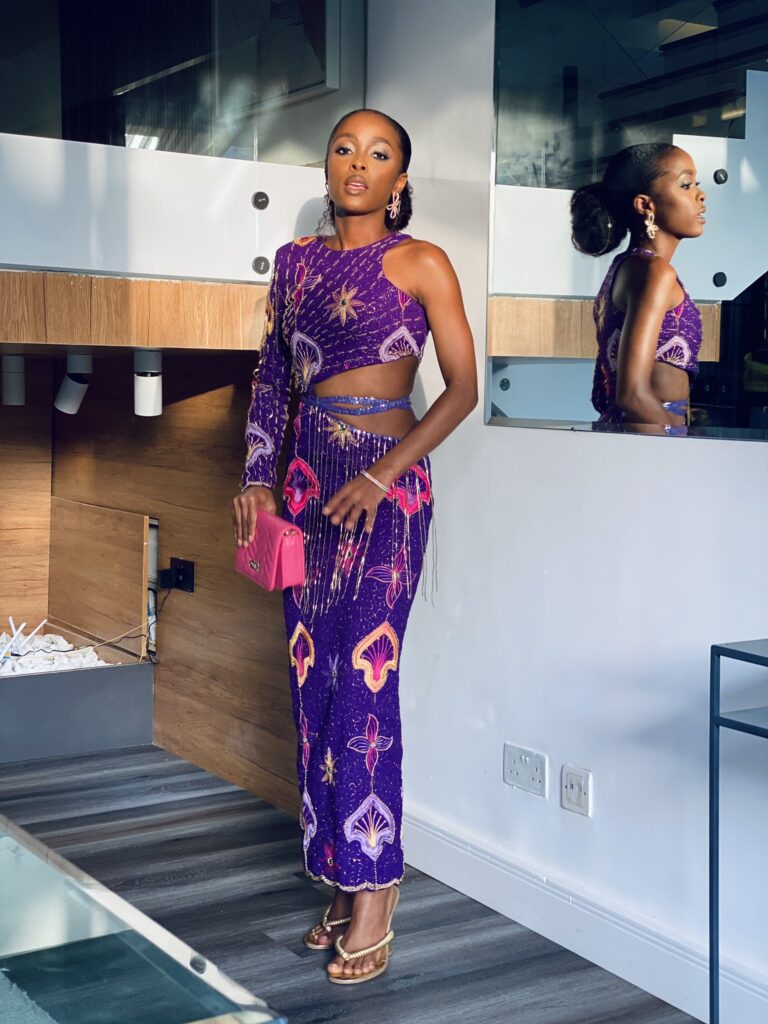
From my observation, one of the high points in Ijogbon was the on-screen chemistry between the four of you. And I want to believe that the relationship started offscreen. How were you able to build that off-screen relationship that eventually translated into what we saw on screen?
Ojuolape: Ebiesuwa has been my best friend since 2014. Before we got to the set, we were already reading and practising our lines together. For Ruby, it was the first time I was working with her as a co-actor. Prior to Ijogbon, I had worked with her as a hired actor on a set where she was the producer. Fawaz was our younger brother on set. He is free-spirited and playful. When we weren’t shooting, we behaved as siblings: we played and ate together. This friendly relationship extends to the veteran actors. And this made working on the set fun.
Akubueze: I wouldn’t say I have a relationship with any of them outside Ijogbon. As Kayode said, the first experience we shared was producer-actor inclined. It was with Ijogbon that I had my first actor-actor experience with Kayode. They (Ojuolape, Ebiesuwa, and Aina) are fantastic actors and it was easier to build chemistry with the three of them. Everything you saw on screen was not built from residual experience.
Ebiesuwa: As Kayode said, we have been best friends for a while. We were course mates and roommates and I have directed him during our university education. Due to our relationship, I knew it would be easy working with Kayode. For Oby, when I read the script, I was looking forward to seeing who would play the role. When I saw Ruby for the first time, I initially thought she was seventeen until she or someone mentioned she wasn’t. Ruby is a fun person. Fawaz is naturally playful and this made it easier to connect with him. In all, we created that synergy on set.
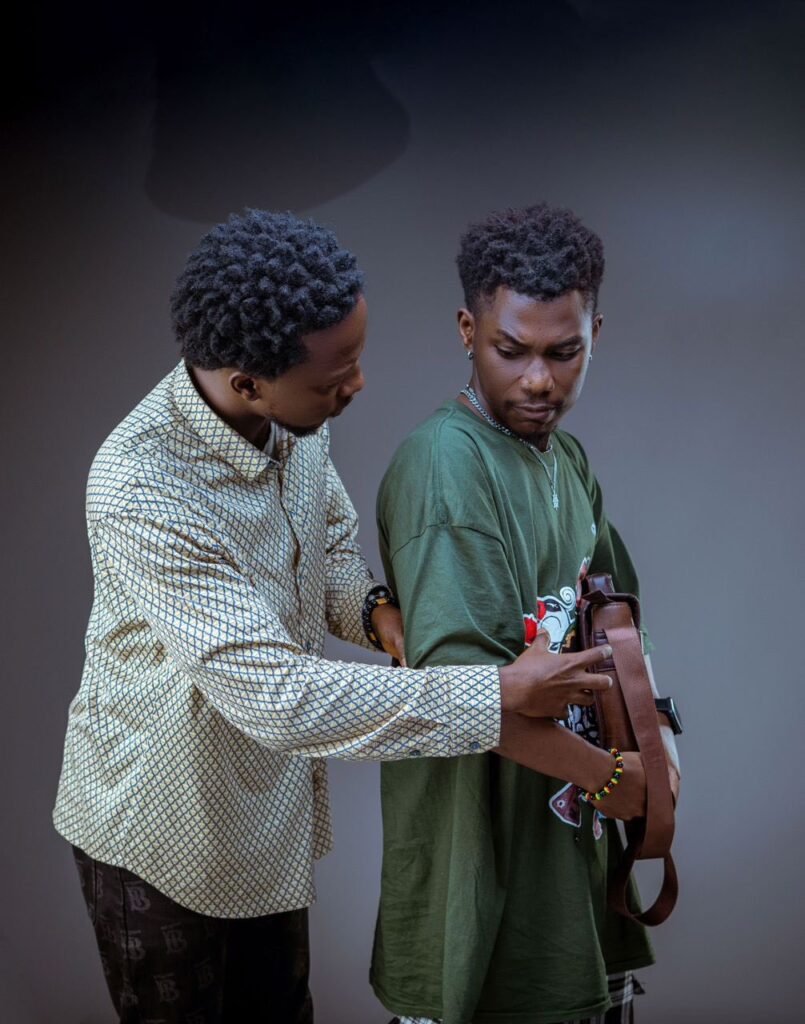
You were acting with veteran Nollywood filmmakers and actors. How did this make you feel? And how were you able to get past being star-struck and deliver a commendable performance?
Ojuolape: First, I am a professional. I knew I had a job to do which I don’t intend to mess up. As I mentioned earlier, the veteran actors made working with them friendly. Before we went to the set in Oyo-Oke, we had a table read in Lagos where we talked, ate, and conversed. For me, it was such an honour working with actors who I watched growing up in close range.
Akubueze: The only older actor I worked with directly was Tana Adelana (Oby’s mother). She’s a pleasant person who made connecting with her as a human and actor easy. She was the only older character I got to work with hand-in-hand.
Ebiesuwa: For me, the challenge was internal. I was concerned about doing well, not the reception of the older actors. The older actors’ reception was encouraging. I discovered most of the veteran actors were alumni of OAU and this brought about a sort of common ground. We spoke about Ife and life generally. In the hotel we lodged, I had personal conversations with some of the veterans which made me feel relaxed. In all, the energy from the veterans was cool and welcoming. I was just internally concerned about giving a commendable performance. Working with Kunle Afolayan changed my preconceived idea of his directing pattern. I thought Afolayan would be strict. But he wasn’t.
The Nigerian youth, due to how depressing the Nigerian economic situation is, is like Jamiu who is passionate about “japaing”. I am curious, are you also interested in migrating? And what do you think about this issue of Nigerians leaving the country in large numbers?
Ojuolape: I don’t feel like “japaing”. I have a career to build in Nigeria. Although one of my dreams is to act in Hollywood productions, I don’t intend to have a base there. I intend to be a global actor based in Nigeria. And honestly, if anyone wants to “japa”, they should. As a Nigerian, I understand Jamiu’s concern. Jamiu is more educated, smart, and courageous compared to his age mates. And he feels his community can’t satisfy his needs. And so, if someone believes the country isn’t providing for them, they should leave.
Akubueze: “Japaing” often comes to one’s mind occasionally. When it comes to health, education, and job opportunities, everyone can see they aren’t at their greatest in Nigeria. As an adult trying to survive, it does come up in conversation. But at the end of the day, Nigeria is still our country. And if we all leave, who will maintain our culture and sustain the country? Despite wanting to migrate, we still need to consider what will become of Nigeria.
Ebiesuwa: As opposed to Ranti’s character, I want to “japa”. At the end of the day, the goal is to be financially stable. Despite being someone whose life revolves around my family and is concerned about creating memories with my loved ones, I’m still interested in migrating. The same way I am interested in migrating is equally the way I am passionate about making it in Nigeria. I don’t want to spend my most active years amongst strangers. But still, I want to “japa.”
The premise of Ijogbon was how something valuable and coveted, in this case, diamonds, can result in greed. When we examine this premise with Nigeria’s present state, it could mean that our abundant natural resources have become a problem for us. Did you, at any point during filming have a similar thought?
Ojuolape: Obviously, the film, Ijogbon, and the diamonds are metaphorical. The diamonds are a metaphor for Nigeria; of how leaders covetously sit on the wealth of the country. These leaders present themselves as fighters for the masses when in the real sense, they are selfish. For me, I believe Ijogbon is an awareness, to capture this political issue in Nigeria.
Akubueze: All the natural resources we have in the country do not belong to a set of individuals. But unfortunately, it is the reality in Nigeria. Leaders who are supposed to manage these resources for the masses’ benefit are the ones keeping them for their selfish interests. And this is what happens in the film. Everyone is interested in keeping the diamonds for themselves as opposed to sharing them with others.
Ebiesuwa: Reading the script of Ijogbon created in my mind, a miniature Nigeria in a rural setting. The script, for me, mirrored our daily experience as Nigerians. In the film, certain characters (Chief Owonifari and Kasali) believe they can have the diamond for themselves. The script, for me, mirrors that as humans we are greedy and self-centred.
Seyi Lasisi is a Nigerian student with an obsessive interest in Nigerian and African films as an art form. His film criticism aspires to engage the subtle and obvious politics, sentiments, and opinions of the filmmaker to see how it aligns with reality. He tweets @SeyiVortex. Email: seyi.lasisi@afrocritik.com




